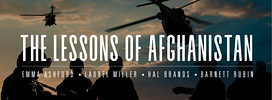Emma Ashford has provided a thoughtful reply to the response essays written by me, Barnett Rubin, and Hal Brands. I agree with her that there is a lot of work to do in examining retrospectively what the United States did in Afghanistan over the last twenty years, why it did those things, and why the results were so far below the expressed expectations.
Now, with completion of the U.S. and NATO withdrawal only weeks away, I have more questions than answers about the retrospective picture. The more fundamental the questions, the harder they are to answer.
One of those fundamental questions is whether Afghanistan and the United States would have been better off if the United States had never invaded in 2001—if it had chased al Qaeda, heedless of Afghan sovereignty, but had left the Taliban regime in place. That would have avoided the nation-building entanglement, the insurgency and counter-insurgency, harms done to Afghan civilians, the costs of military deployment, and any U.S. sense of responsibility for fixing anything in the country. But what exactly would this alternative history look like? Would the Taliban regime’s abuse of the population and (to put it mildly) poor governance have been just another chronic problem in the world, with no further acute manifestations like hosting the leadership of an international terrorist group? As much as many Afghans lament American errors during the last 20 years, would most of them have preferred no toppling of the Taliban?
Another of those questions is whether it is really conceivable that the United States could have fought the war differently in ways that really would have made a difference. Many analysts have pointed to ways in which U.S. military tactics in Afghanistan helped fuel the conflict (for instance, night raids on Afghan homes in rural areas and targeting mistakes, which stoked antipathy toward the U.S. and Afghan governments). Some of the points Rubin makes in his excellent response essay point to how the U.S. approach to counter-terrorism did this. But what exactly would a better fought war have looked like, and is it really imaginable that the U.S. military could have fought the war in any radically different way than it did? If there is a plausible alternative history in this regard that takes account of how the U.S. military works, in which better tactics would likely have produced a different outcome, it needs to be spelled out.
Rubin points to an alternative political history of the war, in which the United States recognizes early on that reconciliation with the Taliban could either prevent an insurgency or nip it in the bud. That is indeed the greatest error to lament. More will need to be written about what it is about American politics and bureaucratic behavior that prevented clear perception of the political dimensions of the war.
There’s a genuine risk that within the U.S. government any efforts to draw “lessons learned” from Afghanistan will focus on the ways and means employed and give short shrift to the big strategic questions and the fundamental choices that were made. Others will probably need to provide the real retrospection.

